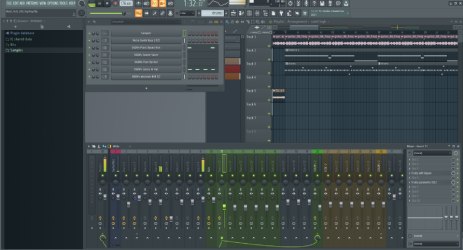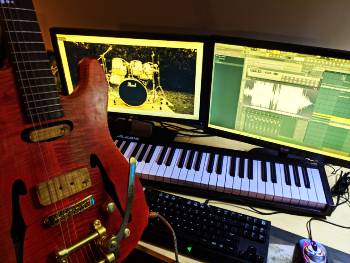Producing music is a job that is exhausting but rewarding. It can be a little tricky to get started, however. If you love to work with music, you might wonder – how do I become a self-made music producer?
We’re here to help you out! Read on to learn about some tips that can assist you in your process of becoming a self-made music producer.
Is Becoming a Music Producer for You?
One of the best things about being a self-made producer is that you can assist your music. Not only will it feel more personal than with a larger producer, but you’ll save money along the way.
Of course, to produce your music, you’ll need to become a self-made music producer. The question may arise – how do I become a self-made music producer? Keep reading to learn about some tips that can help you out.
Be Prepared: It Won’t Be Easy
First, know that this journey won’t be easy. You’re likely going to fail much more than you succeed. It’s just how the industry works.
If you can toughen yourself up, you’ve prepared yourself for the industry. You’re going to fall more times than you get up, but you have to get up. That’s where the growth happens.
Get A Digital Audio Workstation (DAW)
Get a DAW, or digital audio workstation, as soon as you can. This is where you will be creating your music! Learning to use it properly is a critical part of your job.
Here is a list of the top DAWs used:
- FL Studio
- Ableton
- Reaper
- Studio One
- Pro Tools
- Garageband
Each has its benefits and disadvantages and its own workflow. Try the demo version of a few and see which one works best for you!

The more comfortable you are with a DAW, the more experience you will gain. Try to create beats every day to help you learn the DAW and get more proficient at creating beats!
That way when you’re in a room with an artist you can quickly create a beat for them and get the energy flowing.
Doing a daily 10-minute beat challenge is a great way to speed up your process and refine your skills. Check out my article on 10-minute beat challenges for more info!
Learn Music Theory
Music theory can provide a lot of help to your career as a producer. It will allow you to create music quicker and allow you to bring what you hear in your head to reality. Additionally, you’ll be able to talk the same language as other artists or music producers.
What key is the song in? What’s the BPM? Can we try a simple I-III-V progression?
These are some basic terms that are good to know!
Become as familiar with it as you can, memorizing chords, scales, patterns, and rhythms.
You can learn about music theory:
- By yourself, through online sources.
- Through a local class – like piano or guitar lessons.
- In online instruction
All of these can give you valuable education.
The more you know about music, the better. Music theory will give you a leg up on the competition.
Don’t let the lack of music theory stop you from making music though! You don’t need music theory to get started in music and you can learn it as you go.

Listen to Lots of Music
A good music producer is well-versed in the industry they’re in, but not limited to it. It’s good to expand what you’re listening to, especially outside of the genres you produce.
Bringing ideas and inspiration in from other genres is a great way to start creating something new and even develop your own unique sound that others come to you for.
Take in as much as you can daily for the best results.
Aim For An Internship
An internship will do you so much good. Keep an eye out for a music production internship to gain valuable experience that will prepare you for the job.
Maybe you can job shadow at your local music recording studio for instance. Take a notebook and take notes! What questions are they asking the artist? How are they arranging songs? How are they inspiring the artist? What are they doing in general?
Ask to work for free at a recording studio – cleaning up the studio after the recording studio, being the coffee guy, waiting at the door for the artist to show, etc.
Whatever it takes for you to get in the studio and observe what happens. Take notes, when you become more familiar ask if you can help set up the microphones, ask if you can stay after hours to try mixing the songs.
Try to learn the process and what goes on, it’ll help you when you start producing for artists.
Internships might appear online, and you can apply for these. However, most will happen through connections. Keep talking to people, always.
Learn an Instrument
Some of the best music producers are the ones that are familiar with playing an instrument themselves. It can’t hurt to pick up one and learn it yourself.
Some of the best instruments to learn include:
- Piano
- Guitar
- Drums
All of these hold a special place in the sound-based world.

When you know an instrument, you have an insight into music production that few have. Ensure you use this skill to your advantage when you work your way up the ladder.
Create As Much Music As You Can
Make as much music as you can, producing and mixing your songs. Creating a lot of music will give you experience in mixing, mastering, DAW knowledge, song structure, and so much more! The more you manage to put out into the world, the more you’ll get back in.
You can make anything, such as:
- Demo beats
- Full songs
- Experimentations
As long as you are creating, you’re doing the right thing.
Making your music will give you a leg up in the industry. Practice your skills as much as you can.
When I first bought FL Studio I decided to wake up 1 hour early every day and make a beat during that time! Some beats took me longer, some were completed in that hour.
But, after a year I created 300 beats!
Here are the first 5 beats I made:
And here is beat 300:
That’s a big difference!!
Those first few beats were pretty ugly! But, don’t overthink it and just keep creating. Finish your beats and move on to the next. Progression will be a rollercoaster ride – somedays you will feel like a beat god other days you will wonder what you are even doing. Push through it!
Get a Production and Recording Space
A dedicated music production space will help you focus on creating music by removing your everyday distractions. Additionally, you’ll have a place to bring the artist that isn’t your house and where you won’t have to worry about being too loud.
Now, this isn’t possible for many new producers – it’s expensive after all.
Even setting up a room that is used for making music will do in the early days. You can sound treat it with curtains and foam blocks to help reduce the noise and whenever you enter that room you know it’s time for music production – whether it’s creating beats or recording an artist.
And, if you don’t have a room that you can dedicate to music production, having set times that you work on producing music can help you focus on the tasks at hand.
Network, Network, Network
Lastly is the classic – network, network, and network! To become a successful self-made producer, you need to meet as many famous connections as you can.
To network, you should:
- Join online communities – Discord is a great way to become part of one!
- Attend parties and gatherings – don’t just pitch ideas, get to know the person!
- Go to conferences and classes.
- Call, text, and email.
- Enter beat battles – placing high can gain you followers or even a connection with the host.
All of these are great ways to network.
The more you network, the better you’ll be able to move up in the industry. It’s all about the connections.
A Final Word
If you want to become a self-made producer, you have a long journey ahead of you. The road can be harsh. However, if you know how to push yourself, there’s room for you in the world of music.
- Music Producition is hard, don’t give up.
- Get a DAW to create music in.
- Learn some music theory.
- Learn an instrument, like piano.
- Listen to a variety of music.
- Internship at a music studio.
- Practice creating music daily.
- Have a dedicated production space.
- Network with other producers and artists.
With some of these tips, we hope you can push forward and get yourself started on the career path of becoming a music producer. With any luck, you’ll have your dream job in no time.

